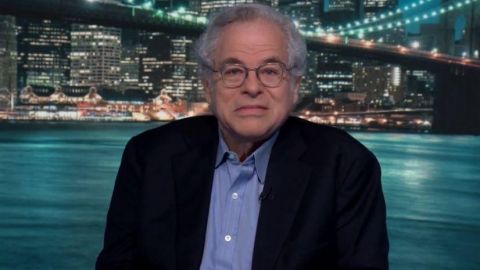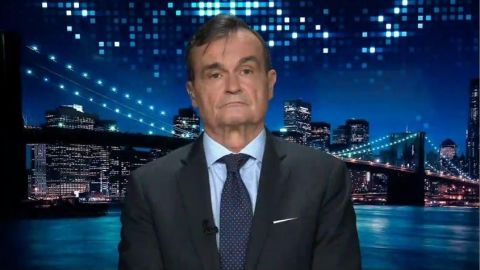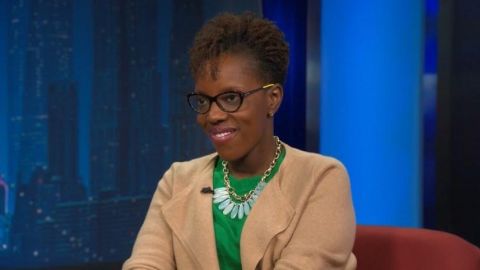Read Transcript EXPAND
ALICIA MENENDEZ, CONTRIBUTOR: So tell me, what is the Magnolia Mothers Trust?
AISHA NYANDORO, CEO SPRINGBOARD OF OPPORTUNITIES: Yes. The Magnolia Mothers Trust is this magical program that really is about restoring dignity into the lives of low-income African-American mothers. And it’s in a premise that you give individuals cash and trust that they have agency and know what to do with those resources. So the mechanics of this program is that we’re providing a thousand dollars a month for 12 months to low-income African-American mothers who live in federally subsidized affordable housing with no strings attached. Understanding that we trust them, we see them. They understand better than anyone what it is that they need to be successful in their lives, and it’s allowing them that agency to go out and make those dreams actualized.
MENENDEZ: Why target that specific demographic?
NYANDORO: You know for us, we truly believe that when you invest in the most vulnerable in society, society as a whole, flourishes. Because of some of that income and gender inequality as it relates to wages and the punitive aspects of the social safety net system, African-American women have become the most vulnerable in this community. And so we are saying that if we invest in those who have been most targeted, that’s some of the negative aspects of the social safety network as well as really the wages within this country, we can see what happens as a whole and it benefits all of us, just not these families. Because the data is really clear when individuals have resources, communities flourish, long-term economic outcome flourishes, education flourishes. So we are trying it and we’re going to see what happens.
MENENDEZ: Unpack something for me that you’re saying which is the negative elements of the social safety net. What are those? How do they manifest?
NYANDORO: Yes. No, thank you. That’s a very good question. So a lot of individuals do not realize the various steps within our social safety net system and the punitive aspect of it. So what I mean with the punitive aspect is that whenever your income increases, your benefits immediately decrease, not allowing you an opportunity to get settled or really figure out how to navigate what it now means to have additional income. And not only is it punitive in that regard, but it also takes away your dignity as an individual, because none of these systems are connected. So there is a lot of bureaucracy that’s involved in going to multiple offices to get certification or recertified and really having to prove that you are poor enough to receive these benefits. So it’s a dehumanizing process that really doesn’t allow individuals to show up in their full selves.
MENENDEZ: How long have you been running this program?
NYANDORO: So I have been running the organization that actually leads this program, Springboard to Opportunities, for about seven years now. The Magnolia Mothers Trust launched this past December and we have been in this pilot phase for the last seven months, working alongside our families and just really being on this magic transformation with them.
MENENDEZ: And the results?
NYANDORO: The results have been above and beyond anything that we expected. These women understand the urgency of this moment, and it has been an immediate return on investment for us as an organization and for them within their lives. We have seen as a whole collectively the 20 women in this pilot have paid off about $10,000 in debt. And not only that, individuals on average have saved about $500 which makes them better off than a lot of individuals that we’re seeing when they know that very few Americans have $400 saved to deal with an emergency. So they’re saving, they’re planning. We have seen women go back to School. We’ve seen now women actually complete their community college degrees because they now have opportunity to take time off for work or work less hours than when they had this income. But not only are we seeing these differences manifested in these large ways that will impact their life in much better ways down the road, we’re just seeing them show up differently every day.
MENENDEZ: What does that mean, show up differently?
NYANDORO: That means that they’re able to — feel like they can parent differently, that they’re not stressed, that they can be involved with their kids’ lives more now that they have joy. They can plan weekend excursions because they have those financial resources. So it’s been beautiful to watch it unfold because it really is seeing them blossom and recognize that they actually can not only just dream, that they now can have their resources and the bandwidth to put those dreams into actualization.
MENENDEZ: Tell me about some of the stories that stand out to you most in the course of the last seven months.
NYANDORO: One of the stories that come to mind to me most really is one of our moms and her name is Zakia. Zakia has paid off $1800 in debt and $1800 in quite frankly predatory college that she received when she was trying to better her life. And so she got into this debt and was unable to continue her education, was trapped into an hourly wage job, just really trying to make sure that she was doing what she needed to do to take care of herself and her three girls. She’s paid off that debt. Not only did she pay off that debt, she was able to use some other resources to get her certification in phlebotomy. And now she is looking for a full-time job and interviewing for full-time jobs in doctors’ offices where she will have benefits, where she’ll be able to have time off and know that her schedule will not be in flux every week because she will have just the stability of a 9 to 5 job that a lot of individuals take for granted.
MENENDEZ: Take me back to when you were calling these women and telling them that they are going to be a part of this.
NYANDORO: That was one of the most interesting days of my life. I mean it was a beautiful moment when we had an opportunity to call the women and let them know that they would be working with us on this journey for this year.
(BEGIN VIDEO CLIP)
NYANDORO: Why am I calling you? You were picked, Beth.
UNIDENTIFIED FEMALE: Yay. Yay. Thank you so much.
NYANDORO: How do you feel? Are you excited?
UNIDENTIFIED MALE: I’m so excited. You just don’t know. I’m so excited.
(END VIDEO CLIP)
NYANDORO: Just hearing the joy in their voices and excitement and also the tears because there were a lot of tears because when you’re talking about $12,000, it’s a life-changing amount of money for this population. And like I said earlier, these individuals, a lot of them make less than $11,000. So $12,000, that is doubling their income. So they understood the magnitude of that moment better than anyone. So for me as a leader, to have the opportunity to know that we were able to do what we needed to do to partner alongside them, it was beautiful, but it also was heartbreaking because I had to make the phone call to the other mothers as well. And when you are in relationships with individuals, you know their stories and you know what they need. And so for a lot of the individuals whom I had to call, I knew the plans that they had. And I really, in some instances, felt like I was breaking those dreams and that’s a hard place to sit with. And it’s still hard with me to sit with, because you want to always do what you feel like you can be doing to help support individuals achieve all that they’re seeking to achieve with their lives.
MENENDEZ: Stepping back and looking at the context in which these individuals are living more broadly, what systems and policies are in place that most affect vulnerable communities?
NYANDORO: Yes. So for our population, it is extremely low-income individuals. So put that in context even further. We’re talking about individuals who make about — who live 200 percent below the poverty index. To put that in context even further, we’re talking about individuals who make on average $11,000 annually. So when you are making that little amount of income and raising a family, there are various systems that converge on your life simultaneously. So there is the system of affordable housing, why you’re subsidized and you receive a voucher. There is a net which provides the opportunity for you to feed your family. There’s even Medicare or Medicaid or some combination of both. You may receive a child care assistance or that voucher. There is temporary assistance for families. So there are all of these various pieces that are not interconnected but all have a say in [13:50:00] how you live your life and what’s possible for you and your family.
MENENDEZ: This is a program that’s done by lottery, but it is still opt- in. Meaning that the people who are coming to you, they know about the program, they actively want to participate. Does having that type of participant skew the results?
NYANDORO: I don’t think so, because individuals — because not all individuals who are participating in the lottery are the same. You know, we have some individuals who have been in the lottery, who participated in the lottery who have not worked for years. Where some of our other moms who participated in the lottery had worked full-time for the last 20 years at minimum wage jobs and hadn’t had the opportunity to get their footing. So I don’t know if the results will be skewed based on that because of the fact that it was a lottery that was open to the individuals who live in the communities that we work in, and those individuals are very different. It’s not just one demography of women.
MENENDEZ: What is your personal access point for understanding these challenges?
NYANDORO: I truly understand that except for the grace of God there go I. My grandmother had my mom when she was 17 in the Mississippi Delta. And she had to drop out of high school and she had my aunts and uncles and all these other individuals in her mid-20s. And so my mom grew up in deep poverty. And my grandmother grew up in deep poverty. And thanks to various supports that they had, that was not the narrative that my life took, but they never shielded me from that reality. And so my grandmother was a veteran of the Civil Rights Movement. She was very active in that, so I grew up firsthand seeing that and working in community and understanding what it looks like to be an advocate with individuals and not trying to hold power over. And so my access point as a woman of color, African-American woman living in this country, understanding what those challenges are but not ever saying that my challenge is their challenge because our lives have been tremendously different. But I see them and I understand them. And so that’s my access point. And so it really is just an opportunity to be a vessel and to really, quite frankly, have the honor of being their voice at the table. Because in so many instances, they don’t have access to those tables.
MENENDEZ: There is a lot of buzz right now around the concept of Universal Basic Income, and that is a program that can take many forms, but at its core is a thousand dollars a month for individuals over the age of 18 in perpetuity, that you get to opt into. What makes this different than UBI?
NYANDORO: At the end of the day, the premises are the same, about the dignity, economy, and trusting individuals, and making sure that folks have the resources that they need to live their best lives. So our ideals are similar regarding net framing of the dignity that cash provides. But this is different in regard to our population really are saying, OK, this is about economic and racial justice and understanding that for this population, specifically, the narrative has been so negative. How do we go about reframing that narrative, restoring dignity, and providing the cash without any strings attached?
MENENDEZ: Have you seen any instances where this pilot has failed?
NYANDORO: I will say that there are individuals who are struggling. And I think the rationale for that is that when we are looking at even with the pilot of 20 individuals, this pilot of 20 individuals represents the larger dynamics that occur within community and society. So individuals were already struggling. These are folks who live in high poverty from past communities. So to believe that $1,000 is a magic bullet that exhausts all of those ills is not rationale. So yes, there are struggles. I will not sit here and say that everyone is going to tiptoe off into the two-offs when we get to December. But what I will say is that the return on investment outweighs those struggles. And for those individuals who still are trying to find their footing that they would even argue that they are better off because they have hope and they have been able to sit in dignity.
MENENDEZ: Thank you so much.
NYANDORO: Thank you so much.
About This Episode EXPAND
Adel al-Jubeir speaks with Christiane Amanpour about Jamal Khashoggi’s murder. Gerard Araud joins the program to discuss the role of America’s European allies in tense Iran-U.S. relations. Violinist and conductor Itzhak Perlman joins Christiane to discuss the next generation of violinists. Alicia Menendez speaks with Aisha Nyandoro, CEO of Springboard To Opportunities.
LEARN MORE



